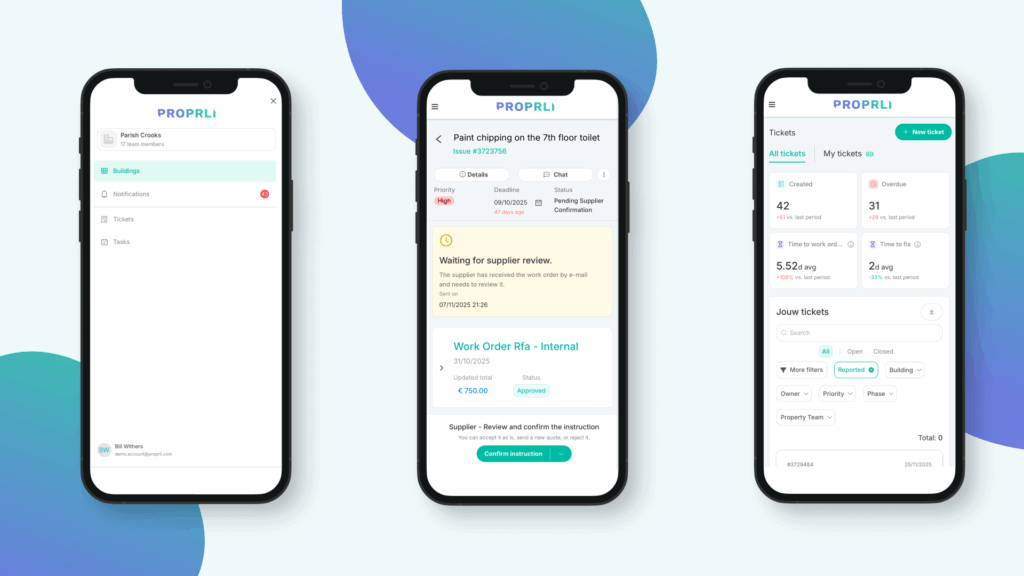Commercial property management encompasses the administrative, operational, and supervisory tasks of non-residential properties. This includes office buildings, retail spaces, and industrial complexes. Property managers are vital in facilitating leasing and tenant management. They handle marketing vacant spaces, analyzing potential tenants, negotiating lease agreements, and addressing tenant inquiries.
Establishing strong relationships with tenants is a key focus. This involves meeting their needs, handling lease renewals, collecting rent, and addressing maintenance or repair issues promptly. Through effective coordination of property operations and facilities management, commercial property managers ensure the preservation and enhancement of property value for owners and investors.
While commercial property management shares similarities with asset management, it is distinct. Property managers do not own the properties they oversee. Instead, they handle the day-to-day oversight, lease administration, tenant relations, maintenance coordination, and risk mitigation on behalf of the property owners.
Key Takeaways
- Commercial property management involves overseeing non-residential properties
- Key responsibilities include leasing, tenant relations, and maintenance
- Building strong tenant relationships is crucial for success
- Property managers ensure the preservation and enhancement of property value
- Commercial property management differs from asset management and facility management
Understanding the Fundamentals of Commercial Property Management
Mastering the basics of commercial property management is crucial for effective oversight of real estate. At its essence, it involves a third-party contractor managing properties daily. This includes tasks like repairs, maintenance, security, and upkeep to maintain property value and generate income for owners.
Property managers follow key principles, representing owners of investment properties like shopping centers and industrial parks. They handle tasks assigned by owners, ensuring the property operates smoothly and profitably.
The foundation of property management encompasses a broad range of duties, including:
- Screening potential tenants
- Drafting and renewing leases
- Collecting rent
- Arranging repairs and maintenance
- Setting budgets
- Understanding and complying with landlord-tenant laws
- Marketing properties
- Supervising employees
- Handling taxes
To effectively execute these duties, property management companies must stay current with state and local laws. Compliance is essential to avoid legal problems and maintain a good industry reputation.
Understanding the fundamentals of commercial property management is key to successful real estate operations. By grasping core principles and responsibilities, property managers can enhance property performance, meet tenant needs, and add value for property owners.
Types of Commercial Properties and Their Unique Management Needs
Commercial property management spans a broad spectrum, each type presenting its own set of challenges and requirements. From vibrant retail centers to cutting-edge office spaces and vast industrial complexes, managers must tailor their strategies to meet each property’s specific needs. Let’s delve into the unique management considerations for various commercial properties.
Retail properties, encompassing shopping malls, restaurants, and convenience stores, require a focus on tenant mix, foot traffic, and customer experience. Managers must select a diverse array of tenants to draw in shoppers and foster a lively atmosphere. A clean, safe, and welcoming environment is paramount for retail property management. Additionally, ensuring proper maintenance and repairs is essential to keep the property in excellent condition.
Office property management, which includes overseeing real estate brokerages, medical practices, and co-working spaces, prioritizes tenant satisfaction, amenities, and lease negotiations. Managers aim to create a professional and productive work environment by offering high-quality amenities, efficient maintenance services, and prompt communication with tenants. Securing favorable lease terms and managing tenant turnover are critical aspects of successful office property management.
Industrial property management, covering manufacturing facilities, warehouses, and distribution centers, focuses on safety, security, and logistics. Managers must adhere to strict safety regulations, implement robust security measures, and optimize the flow of goods and materials. Maintaining the property’s structural integrity, coordinating with tenants on their specific needs, and facilitating efficient operations are key responsibilities in industrial property management.
| Property Type | Key Management Considerations |
|---|---|
| Retail |
|
| Office |
|
| Industrial |
|
Special-purpose properties, such as theaters, sports arenas, resorts, senior care facilities, schools, and places of worship, have unique management needs based on their specific functions and user requirements. Managers must have a deep understanding of the property’s purpose, the needs of its users, and any specialized maintenance or operational requirements. Adapting to the ever-changing demands of these properties is a hallmark of effective commercial property management.
By recognizing the distinct characteristics and challenges associated with each type of commercial property, managers can tailor their approaches to optimize tenant satisfaction, maintain property value, and ensure the long-term success of the properties under their care.
Key Responsibilities of a Commercial Property Manager
A commercial property manager is crucial for the smooth operation and profitability of various properties. Their duties range from daily maintenance to tenant relations and financial reporting. Let’s delve into the essential tasks that contribute to the successful management of commercial real estate.
Handling the daily operations of the property is a primary responsibility. This includes addressing maintenance requests promptly, overseeing essential services, conducting regular inspections, and collecting rent. By focusing on these tasks, a property manager ensures the property remains well-maintained and functional.
General property maintenance is another key aspect of a property manager’s role. They oversee various upkeep tasks, such as snow removal, landscaping, and property updates. Proactive maintenance helps preserve the property’s value and attractiveness.
Effective tenant management is critical. A skilled property manager builds strong tenant relationships by responding to requests and addressing concerns. They handle lease renewals, secure new tenants, and ensure lease compliance.
Marketing the property is also essential. A property manager develops marketing campaigns to attract quality tenants. This involves creating appealing listings, leveraging online platforms, and showcasing the property’s unique features.
| Responsibility | Description |
|---|---|
| Legal Compliance | Ensure compliance with relevant landlord-tenant laws and regulations, which vary by state and locality |
| Financial Reporting | Prepare accurate financial reports, including income and expense statements, to help property owners assess the performance of their investment properties |
| Vendor Management | Select, coordinate, and oversee various vendors and contractors involved in property maintenance and improvements |
| Emergency Preparedness | Develop and implement emergency response plans to ensure tenant safety and minimize property damage in case of unforeseen events |
In summary, a commercial property manager’s role is diverse and demanding. It requires technical knowledge, communication skills, and problem-solving abilities. By effectively executing these tasks, a skilled property manager contributes to the success and profitability of commercial real estate investments.
Strategies for Effective Tenant Relations in Commercial Properties
Building strong tenant relationships is crucial for successful commercial property management. Effective tenant relationship management ensures tenant satisfaction and long-term retention. By focusing on regular communication, addressing tenant needs, and creating a positive atmosphere, property managers can foster a mutually beneficial relationship with their tenants.
One key strategy for maintaining tenant satisfaction is through open and consistent communication. Property managers should establish regular communication channels, such as email updates, newsletters, or in-person meetings. This keeps tenants informed about building news, maintenance schedules, and upcoming events or changes. This proactive approach allows property managers to gauge tenant sentiment, identify potential concerns, and gather valuable feedback on how to improve the tenant experience.
Catering to tenant needs is another crucial aspect of effective tenant relations. Property managers must understand the unique requirements of each tenant based on their specific industry and property type. For instance, in retail spaces, it is essential to consider tenant compatibility and avoid placing similar businesses in close proximity to minimize competition. By taking a tailored approach to tenant needs, property managers can create a more harmonious and thriving commercial environment.
Creating a safe, comfortable, and attractive atmosphere within each commercial unit is paramount to tenant satisfaction and retention. Property managers should prioritize regular maintenance, upgrades, and repairs to ensure that tenants can operate their businesses without disruption. Responding promptly to tenant inquiries and maintenance requests demonstrates a commitment to their well-being and helps build trust and loyalty.
| Strategy | Benefits |
|---|---|
| Regular Communication |
|
| Catering to Tenant Needs |
|
| Maintaining a Positive Atmosphere |
|
By implementing these strategies, commercial property managers can cultivate strong, long-lasting relationships with their tenants. Investing time and effort into tenant relationship management, satisfaction, and retention ultimately contributes to the overall success and profitability of the commercial property.
Maintaining and Enhancing the Value of Commercial Real Estate
Commercial property managers are crucial in keeping and boosting the value of the properties they manage. They do this by implementing effective maintenance strategies, making timely improvements, and focusing on upgrades. This ensures that commercial real estate stays appealing to tenants and maintains its market value.
Regular maintenance is key to avoiding expensive repairs, keeping the property looking good, and ensuring tenant safety. A detailed maintenance plan should cover all parts of the commercial property. This includes:
- Plumbing and electrical systems
- Building infrastructure
- Pest control
- Landscaping
- HVAC systems
- Wear-and-tear repairs
- Code violation corrections
- Necessary upgrades
Proactive maintenance saves money by fixing small problems before they get bigger. It also keeps property values high and prevents injuries or accidents.
Improvements and upgrades also play a big role in tenant satisfaction and retention. Tenants often look for newer spaces with better features. Investing in cost-effective upgrades can keep your commercial property competitive in the market. Some minor upgrades that can make a big difference include:
| Upgrade | Benefit |
|---|---|
| Installing new light fixtures | Improved energy efficiency and aesthetics |
| Updating smoke detectors | Enhanced safety and compliance with regulations |
| Replacing electrical appliances in common areas | Increased tenant convenience and satisfaction |
By focusing on property value preservation through consistent maintenance, strategic improvements, and targeted upgrades, commercial property managers can ensure that their real estate assets remain valuable and attractive to both current and prospective tenants.
Navigating Legal and Regulatory Aspects of Commercial Property Management
Commercial property managers must be well-versed in property management laws and landlord-tenant regulations. These laws vary significantly by state. Therefore, it’s crucial for managers to understand the specific requirements in their area.
In most states, property management companies need a license from the local real estate board to operate legally. Property owners should always check if the firms they hire are licensed and compliant. This helps to minimize legal risks.
Maintaining compliance also means ensuring commercial properties meet fire and life-safety regulations. Not keeping these systems up-to-date can lead to fines and penalties. It also poses risks to the property and its occupants.
To effectively navigate legal and regulatory aspects, commercial property managers should:
- Stay informed about changes in local and federal regulations
- Develop a comprehensive understanding of landlord-tenant laws in their jurisdiction
- Regularly review and update property management policies and procedures
- Maintain open communication with property owners regarding compliance matters
- Conduct periodic audits to identify and address any potential compliance issues
By prioritizing compliance and staying proactive in legal and regulatory matters, managers can reduce risks. They protect property owners’ interests and create a safe environment for tenants.
Leveraging Technology for Efficient Commercial Property Management
In today’s fast-paced business environment, commercial property managers are turning to technology to streamline their operations and enhance efficiency. By investing in reliable property management software, managers can effectively handle the complexities of managing diverse commercial spaces. These digital tools help organize essential information, track rental income, expenses, tenants, regulations, turnover rates, work orders, and scheduled maintenance tasks, all in one centralized platform.
Embracing property technology, or proptech, enables property managers to work smarter, not harder. By automating processes and leveraging data-driven insights, managers can make informed decisions that optimize their properties’ performance. Digital property management solutions also facilitate seamless communication with tenants through online portals and mobile apps, improving responsiveness and overall satisfaction.
The benefits of integrating technology into commercial property management practices are clear:
- Increased efficiency through automated workflows and centralized data
- Enhanced tenant experience through digital communication channels
- Improved decision-making based on real-time data and analytics
- Cost savings through streamlined processes and reduced manual labor
- Better overall property performance and asset value
As the commercial real estate landscape continues to evolve, property managers who embrace proptech and adopt digital property management strategies will be well-positioned to succeed. By leveraging the power of technology, managers can effectively navigate the challenges of managing diverse properties while delivering exceptional value to both property owners and tenants alike.
What is Commercial Property Management? A Comprehensive Overview
Commercial property management encompasses the efficient operation and oversight of non-residential real estate. It involves a broad spectrum of duties, from daily maintenance and security to inspections and tenant communication. It also includes ensuring compliance with laws and regulations. For property owners, investors, and tenants, grasping the nuances of commercial property management is essential.
A top-tier commercial property management company excels beyond the basics. They focus on fostering strong tenant relationships and enhancing property value and profitability. Property managers act as the public face of the company, striving to retain tenants and maintain high occupancy rates. This is critical for the property’s long-term success.
Property managers are crucial in managing various commercial properties, such as office buildings, retail spaces, and industrial buildings. They protect and enhance the asset’s value while ensuring tenant satisfaction. Key aspects of commercial property management include:
- Rent collection and financial management
- Maintenance and repairs
- Tenant screening and leasing
- Vendor management and contract negotiation
- Risk management and insurance
- Regulatory compliance
- Budgeting and financial reporting
To grasp the breadth of commercial property management, let’s examine the different types of commercial properties and their distinct management requirements:
| Property Type | Management Needs |
|---|---|
| Office Buildings | Ensuring a professional environment, managing common areas, and providing amenities to attract and retain tenants |
| Retail Spaces | Maintaining an attractive and welcoming atmosphere, coordinating with tenants for promotions and events, and managing parking and accessibility |
| Industrial Buildings | Overseeing specialized equipment maintenance, ensuring compliance with safety regulations, and managing logistics and access control |
| Multi-family Properties | Handling tenant relations, maintaining common areas and amenities, and ensuring a safe and comfortable living environment |
In conclusion, commercial property management is a complex field that demands a deep understanding of each property type’s unique needs and challenges. By employing a skilled property management team, property owners can optimize their investments’ value while delivering an outstanding tenant experience.
Conclusion
Commercial property management is a complex field that demands a wide range of skills and deep knowledge. It involves understanding the specific needs of various property types, building strong tenant relationships, and maintaining asset value. Property managers are crucial for the success and profitability of commercial real estate investments. Their role is vital, directly affecting the financial outcomes and long-term viability of these assets.
To excel in property management, professionals must be proactive in maintenance and have a solid grasp of legal and regulatory frameworks. They should also use advanced technology to boost efficiency and performance. The advantages of property management are significant, including higher returns for owners, reduced risks, and the long-term success of investments. Collaborating with a seasoned property management company ensures that commercial properties are well-managed.
The commercial real estate sector is constantly evolving, becoming more competitive. The need for adaptable, innovative, and tenant-focused property management will escalate. Property managers who excel in these areas will thrive in this dynamic industry. By prioritizing tenant needs, staying updated on industry trends, and continually enhancing their skills, they can create lasting value for property owners. This contributes to the health and prosperity of the commercial real estate market.
FAQ
What is commercial property management?
Commercial property management covers the day-to-day tasks of non-residential properties. This includes office buildings, retail spaces, and industrial complexes. It involves lease administration, tenant relations, maintenance, and risk mitigation.
What are the primary responsibilities of a commercial property manager?
A commercial property manager’s key duties include leasing and managing tenants. They oversee property operations and maintenance. They also ensure legal compliance and aim to preserve property value while generating income.
What types of properties fall under commercial property management?
Commercial property management spans various non-residential properties. These include retail, office, industrial, and special-purpose properties. Each type has its own needs and challenges.
Why is tenant relationship management important in commercial property management?
Tenant relationships are vital for commercial property management success. Retaining tenants is more cost-effective than finding new ones. Regular communication and addressing needs help build strong relationships and improve satisfaction.
How can commercial property managers maintain and enhance property value?
Property managers can boost value through regular improvements and maintenance. They address minor issues early and maintain appearance. Investing in upgrades attracts and retains tenants.
What legal and regulatory aspects should commercial property managers be aware of?
Managers must comply with state and national laws. This includes obtaining licenses and maintaining safety systems. Staying updated on regulations is crucial for compliance and risk reduction.
How can technology help in commercial property management?
Technology, like management software, streamlines processes and improves efficiency. It centralizes data, automates tasks, and enhances communication. This leads to cost savings and better performance.






